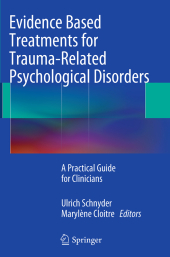 Neuerscheinungen 2016Stand: 2020-02-01 |
Schnellsuche
ISBN/Stichwort/Autor
|
Herderstraße 10
10625 Berlin
Tel.: 030 315 714 16
Fax 030 315 714 14
info@buchspektrum.de |

Marylène Cloitre, Ulrich Schnyder
(Beteiligte)
Evidence Based Treatments for Trauma-Related Psychological Disorders
A Practical Guide for Clinicians
Herausgegeben von Schnyder, Ulrich; Cloitre, Marylène
Softcover reprint of the original 1st ed. 2015. 2016. vii, 523 S. 4 SW-Abb., 9 Farbabb. 235 mm
Verlag/Jahr: SPRINGER, BERLIN; SPRINGER INTERNATIONAL PUBLISHING 2016
ISBN: 3-319-37531-8 (3319375318)
Neue ISBN: 978-3-319-37531-1 (9783319375311)
Preis und Lieferzeit: Bitte klicken
This book offers an evidence based guide for clinical psychologists, psychiatrists, psychotherapists and other clinicians working with trauma survivors in various settings. It provides easily digestible, up-to-date information on the basic principles of traumatic stress research and practice, including psychological and sociological theories as well as epidemiological, psychopathological, and neurobiological findings. However, as therapists are primarily interested in how to best treat their traumatized patients, the core focus of the book is on evidence based psychological treatments for trauma-related mental disorders. Importantly, the full range of trauma and stress related disorders is covered, including Acute Stress Reaction, Complex PTSD and Prolonged Grief Disorder, reflecting important anticipated developments in diagnostic classification. Each of the treatment chapters begins with a short summary of the theoretical underpinnings of the approach, presents a case illustrating the treatment protocol, addresses special challenges typically encountered in implementing this treatment, and ends with an overview of related outcomes and other research findings. Additional chapters are devoted to the treatment of comorbidities, special populations and special treatment modalities and to pharmacological treatments for trauma-related disorders. The book concludes by addressing the fundamental question of how to treat whom, and when.
Introduction
Part I
Traumatic stress: the basic principles
Epidemiology of trauma and trauma-related disorders, trauma as a public mental health issue
Psychological and sociological theories (fear conditioning, other emotions, memory, cognitive theories, psychodynamic theories, PTSD as a social construct)
Neurobiological findings
Trauma and physical health
Part II
The diagnostic spectrum of trauma-related disorders
Acute Stress Reaction, Acute Stress Disorder
Posttraumatic Stress Disorder
Complex PTSD
Prolonged Grief Disorder
Part III
Evidence based psychological treatments for trauma-related disorders
Early intervention after trauma
Prolonged Exposure Therapy
<
Cognitive Processing Therapy
EMDR
Narrative Exposure Therapy
Brief Eclectic Psychotherapy for PTSD
STAIR Narrative Therapy
Treatment for prolonged grief disorder
Part IV
Treating special populations
Children
Elderly people
Tortured refugees, issues related to migration
Combat veterans (MST, moral injury, reintegration...)
Part V
Special treatment modalities
Group treatment
Couples treatment
Telemental health approaches
Part VI
Pharmacological treatment for trauma-reated disorders
Part VII
Treating comorbidities, sequencing of treatment
PTSD and SUD
PTSD and BPD
PTSD and chronic pain (including neurobiology)
Part VIII
How to treat whom and when?


